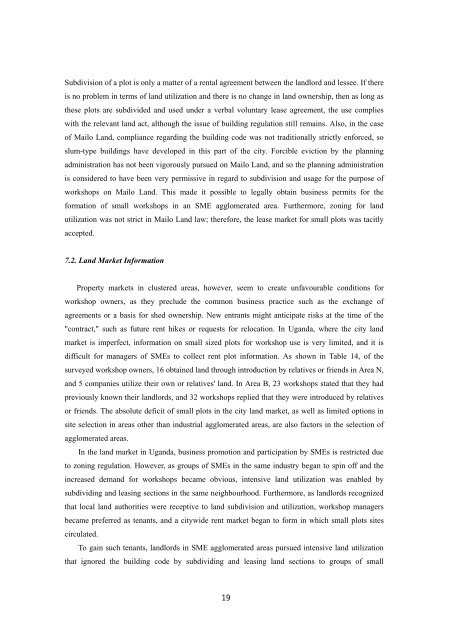Information - ARRIDE - IDE-JETRO
Information - ARRIDE - IDE-JETRO
Information - ARRIDE - IDE-JETRO
You also want an ePaper? Increase the reach of your titles
YUMPU automatically turns print PDFs into web optimized ePapers that Google loves.
Subdivision of a plot is only a matter of a rental agreement between the landlord and lessee. If there<br />
is no problem in terms of land utilization and there is no change in land ownership, then as long as<br />
these plots are subdivided and used under a verbal voluntary lease agreement, the use complies<br />
with the relevant land act, although the issue of building regulation still remains. Also, in the case<br />
of Mailo Land, compliance regarding the building code was not traditionally strictly enforced, so<br />
slum-type buildings have developed in this part of the city. Forcible eviction by the planning<br />
administration has not been vigorously pursued on Mailo Land, and so the planning administration<br />
is considered to have been very permissive in regard to subdivision and usage for the purpose of<br />
workshops on Mailo Land. This made it possible to legally obtain business permits for the<br />
formation of small workshops in an SME agglomerated area. Furthermore, zoning for land<br />
utilization was not strict in Mailo Land law; therefore, the lease market for small plots was tacitly<br />
accepted.<br />
7.2. Land Market <strong>Information</strong><br />
Property markets in clustered areas, however, seem to create unfavourable conditions for<br />
workshop owners, as they preclude the common business practice such as the exchange of<br />
agreements or a basis for shed ownership. New entrants might anticipate risks at the time of the<br />
"contract," such as future rent hikes or requests for relocation. In Uganda, where the city land<br />
market is imperfect, information on small sized plots for workshop use is very limited, and it is<br />
difficult for managers of SMEs to collect rent plot information. As shown in Table 14, of the<br />
surveyed workshop owners, 16 obtained land through introduction by relatives or friends in Area N,<br />
and 5 companies utilize their own or relatives' land. In Area B, 23 workshops stated that they had<br />
previously known their landlords, and 32 workshops replied that they were introduced by relatives<br />
or friends. The absolute deficit of small plots in the city land market, as well as limited options in<br />
site selection in areas other than industrial agglomerated areas, are also factors in the selection of<br />
agglomerated areas.<br />
In the land market in Uganda, business promotion and participation by SMEs is restricted due<br />
to zoning regulation. However, as groups of SMEs in the same industry began to spin off and the<br />
increased demand for workshops became obvious, intensive land utilization was enabled by<br />
subdividing and leasing sections in the same neighbourhood. Furthermore, as landlords recognized<br />
that local land authorities were receptive to land subdivision and utilization, workshop managers<br />
became preferred as tenants, and a citywide rent market began to form in which small plots sites<br />
circulated.<br />
To gain such tenants, landlords in SME agglomerated areas pursued intensive land utilization<br />
that ignored the building code by subdividing and leasing land sections to groups of small<br />
19




![Title [書評] 廣田義人著『東アジア工作機械工業の技術形成 ... - ARRIDE](https://img.yumpu.com/47139953/1/184x260/title-arride.jpg?quality=85)






